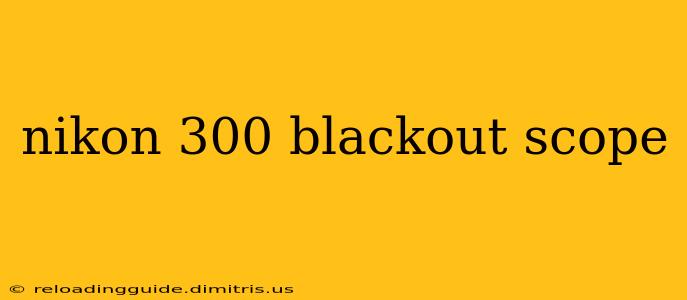The .300 Blackout cartridge has gained significant popularity among shooters for its versatility and effectiveness in various applications, from home defense to hunting. Choosing the right scope for your .300 Blackout build is crucial for maximizing its potential. This guide will walk you through the key factors to consider when selecting a Nikon scope, helping you find the perfect optic for your needs.
Understanding Your Needs: .300 Blackout Applications
Before diving into specific Nikon scope models, it's essential to define how you intend to use your .300 Blackout rifle. Different applications demand different optical characteristics.
1. Home Defense:
For close-quarters home defense, you'll need a scope with a large field of view and quick target acquisition. A red dot sight or a low-power variable optic (LPVO) might be the ideal choice. Speed and simplicity are paramount in this scenario.
2. Hunting:
Hunting applications, particularly at longer ranges, require more precision. You'll need a scope with superior clarity, magnification capabilities, and potentially a ballistic reticle to compensate for bullet drop at various distances. Higher magnification scopes become increasingly valuable.
3. General Shooting and Target Practice:
For general shooting and target practice at varying distances, a versatile LPVO or a mid-range magnification scope offers a good balance between magnification and field of view. This allows you to adapt to different shooting scenarios.
Key Features to Consider in a Nikon Scope for .300 Blackout
Regardless of your intended use, several key features should guide your decision when choosing a Nikon scope for your .300 Blackout rifle:
1. Magnification:
- Low Power Variable Optics (LPVO): These offer versatility, typically ranging from 1-4x or 1-6x magnification. Excellent for close to medium ranges.
- Mid-Range Magnification: Scopes in the 3-9x or 4-12x range provide a good balance between close and long-range shooting.
- High Magnification: For long-range precision shooting, higher magnification scopes (e.g., 6-24x or higher) are necessary. However, they usually come with a smaller field of view.
2. Reticle:
The reticle is the crosshairs within your scope. Consider these options:
- Simple Duplex Reticle: A classic choice, offering a simple, unobtrusive design suitable for most shooting situations.
- BDC (Ballistic Drop Compensating) Reticle: Designed to compensate for bullet drop at different ranges, crucial for longer-range shooting. Choose one calibrated for your specific .300 Blackout ammunition.
- Illuminated Reticle: Offers improved visibility in low-light conditions.
3. Objective Lens Diameter:
A larger objective lens gathers more light, improving low-light performance. Larger objective lenses are generally preferred for hunting in low-light conditions or longer-range shooting.
4. Turrets:
Consider the type of turrets (adjustment knobs) – tactical turrets offer precise adjustments, while capped turrets are more durable and prevent accidental adjustments.
Recommended Nikon Scope Options (General Recommendations, No Specific Model Endorsement)
While specific model recommendations are beyond the scope of this article to avoid the appearance of endorsement, we can offer some general guidance based on the features discussed:
For home defense, consider a Nikon red dot sight or a low-power variable optic (LPVO) with a quick-focus eyepiece.
For hunting, a Nikon scope with higher magnification and a BDC reticle designed for the .300 Blackout cartridge would be beneficial.
For general shooting and target practice, a versatile LPVO or a mid-range magnification scope with a clear and simple reticle is a good option.
Remember to always check the scope's mounting compatibility with your specific rifle before purchasing. Proper mounting is critical for accurate and safe shooting.
This guide provides a framework for selecting a Nikon scope for your .300 Blackout rifle. Thorough research based on your specific needs will lead you to the optimal optic for your shooting experience. Remember to consult with experienced shooters or professionals for personalized recommendations.

